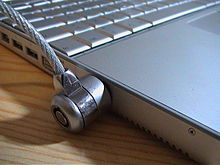The Computer Revolution/Hardware Protection
Computer hardware can be inherently fragile. Heat, water, and physical accidents are the biggest threats to a computer's physical safety. Computers should be properly cleaned on a regular basis to keep dust buildup to a minimum (this protects the unit from excessive heat). Care must also be taken when liquids are used around a computer. Finally, dropping a computer (or most electronic components) can be the kiss of death for the machine.

Besides being fragile, computers are also very valuable. Care must be taken to protect computers from theft. Various locks are available to protect a computer from theft. In addition, there are special tracking systems that can be used to find a computer if it is stolen or misplaced. And for the “nuclear” approach, there are self-destructing devices that become unusable if stolen!
How to Prevent Your Computer From Crashing
editThere are ways to prevent your computer from crashing although this isn’t a guarantee. If your computer crashes it can affect your schedule for those that depend on it for daily activities may cause a loss of data, damage your system and data files and my leave your computer unbootable.
At times rebooting may help or solve the problem but if you haven’t backed up your computer you may be in trouble.
However, at times, computer crashes may occur due to user negligence that may result in virus infections, a damaged registry, or hard disk problems. You can easily prevent computer freeze problems due to this, by performing regular PC maintenance. Let us have look at some of the tasks that you can perform to prevent and recover from computer crashes.
There are a few steps that can be taken to protect your computers hardware. You should first install and use security software. Then you should back up your system regularly. Another step to protecting your hardware is to update your operating system, browser, and e-mail program regularly as well. Finally, test your system for vulnerabilities.